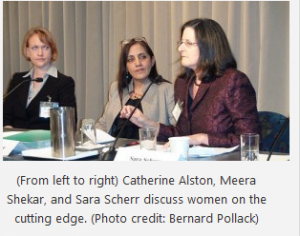 A dynamic trio of passionate advocates for the health of people and the planet were brought together at the 15th Annual Worldwatch State of the World Symposium on January 19th for a panel called Women on the Edge. As Worldwatch Vice President for Programs Bob Engleman pointed out in his introduction, these women are all on the cutting edge of innovative approaches to sustainable agriculture.
A dynamic trio of passionate advocates for the health of people and the planet were brought together at the 15th Annual Worldwatch State of the World Symposium on January 19th for a panel called Women on the Edge. As Worldwatch Vice President for Programs Bob Engleman pointed out in his introduction, these women are all on the cutting edge of innovative approaches to sustainable agriculture.
Meera Shekar, Lead Health and Nutrition Specialist, Human Development Network at the World Bank—and key contributor to the World Bank’s recentFramework for Action for Scaling up Nutrition—talked about the importance of refocusing our efforts on nutrition. She underlined that investments in agriculture and hunger relief have often not delivered in terms of nutrition “which has long been an alien concept to the agriculture and even the hunger community.” Focusing on agricultural yields or calories of food in efforts to feed people, she outlined, has often been done to the detriment of delivering actual vital nutrients. She emphasized that the most important time for preventing the potential negative impacts from malnutrition in a child’s life is during the first three years, starting with pregnancy. “If we had a single dollar to invest in a person or a population,” Shekar stressed,” that would be the most critical time.”
Sara Scherr, President and CEO of Ecoagriculture Partners, addressed the issue of how ecological agriculture has moved from the fringe to the mainstream. She talked about breakthroughs, including those documented in State of the World 2011: Innovations that Nourish the Planet, which enable farmers to increase yields while at the same time providing valuable ecological services. This has enabled organic yields to equal—and even surpass—yields from conventional agriculture methods, as well as create win-win situations where agriculture and the environment are both supported. She speculated that these kinds of innovations could help increase the amount of arable land under ecological agriculture management to 25 percent by 2020.
Program Coordinator of the Cocoa Livelihoods Program, Catherine Alston gave an overview of the work of The World Cocoa Foundation to help increase yields and profits for small cocoa farmers. In West Africa, where 70 percent of the world’s cocoa is grown, 80 percent of the agricultural labor is done by woman. While most of this labor is focused on staple crops, the World Cocoa foundation is working to encourage women to participate in growing cash crops, including cocoa because money women earn is more likely to go to support their families.
All three speakers emphasized that our thinking about challenges we face, from climate change to malnutrition, has to be more complex and cross-sectoral than it has been in the past. As Sara Scherr put it, “we are not looking to pick three or four models that work and apply them across the board, but to focus on innovation systems and methods that produce diverse, locally-adapted positive outcomes.”
The event was live streamed online on Wednesday, January 19, 2011. Stay tuned for video in the coming days.
By Samara Brock

Danielle Nierenberg, an expert on livestock and sustainability, currently serves as Project Director of State of World 2011 for the Worldwatch Institute, a Washington, DC-based environmental think tank. Her knowledge of factory farming and its global spread and sustainable agriculture has been cited widely in the New York Times Magazine, the International Herald Tribune, the Washington Post, and
other publications.
Danielle worked for two years as a Peace Corps volunteer in the Dominican Republic. She is currently traveling across Africa looking at innovations that are working to alleviate hunger and poverty and blogging everyday at Worldwatch Institute’s Nourishing the Planet. She has a regular column with the Mail & Guardian, the Kansas City Star, and the Huffington Post and her writing was been featured in newspapers across Africa including the Cape Town Argus, the Zambia Daily Mail, Coast Week (Kenya), and other African publications. She holds an M.S. in agriculture, food, and environment from Tufts University and a B.A. in environmental policy from Monmouth College.








